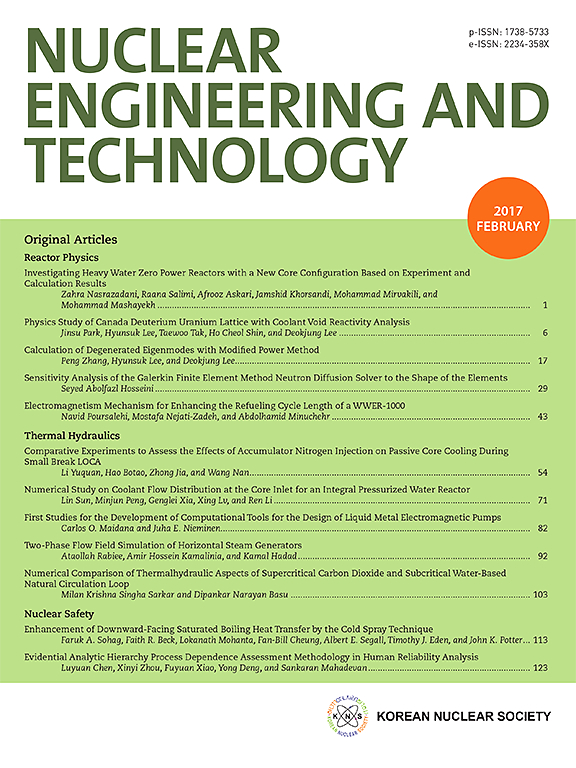Development and validation of the MCCI module in the SAFARI integrated severe accident analysis code
IF 2.6
3区 工程技术
Q1 NUCLEAR SCIENCE & TECHNOLOGY
引用次数: 0
Abstract
This study presents the development and validation of the MCCI (Molten Core-Concrete Interaction) analysis module within the SAFARI (Safety Analysis Code For Severe Accident Risk Identification) code, a regulatory severe accident analysis tool under development in South Korea. The SAFARI code is designed to support Severe Accident Management (SAM) actions. As part of this code, a dedicated module has been developed using a Python-based computational framework specifically designed to perform MCCI analysis. Since MCCI plays a critical role in determining the progression and consequences of ex-vessel severe accidents, it is essential for the regulatory code to include a module capable of accurately analyzing MCCI behavior under a wide range of severe accident scenarios. Under these development objectives, the MCCI module incorporates multi-physics models capable of simulating key phenomena associated with corium-concrete interactions. Validation of the MCCI module was performed using experimental data from selected experiments, specifically ACE-L2, SURC-2, and CCI-2, covering validation scenarios for MCCI geometry, concrete type, and cavity conditions. The simulation results showed good agreement with experimental trends, demonstrating the module's reliability. Additionally, comparative analysis with other existing codes confirmed that the module delivers comparable performance, supporting its applicability in regulatory safety evaluations.
SAFARI集成严重事故分析代码中MCCI模块的开发和验证
本研究介绍了韩国正在开发的严重事故监管分析工具SAFARI(严重事故风险识别安全分析代码)代码中的MCCI(熔融核心-混凝土相互作用)分析模块的开发和验证。SAFARI代码旨在支持严重事故管理(SAM)操作。作为该代码的一部分,我们使用基于python的计算框架开发了一个专用模块,专门用于执行MCCI分析。由于MCCI在确定船前严重事故的进展和后果方面起着至关重要的作用,因此监管规则必须包括一个能够在各种严重事故情景下准确分析MCCI行为的模块。在这些发展目标下,MCCI模块包含了能够模拟与核混凝土相互作用相关的关键现象的多物理场模型。MCCI模块的验证使用了来自选定实验的实验数据,特别是ACE-L2、SURC-2和CCI-2,涵盖了MCCI几何形状、混凝土类型和空腔条件的验证场景。仿真结果与实验结果吻合较好,验证了该模块的可靠性。此外,与其他现有规范的比较分析证实,该模块具有相当的性能,支持其在监管安全评估中的适用性。
本文章由计算机程序翻译,如有差异,请以英文原文为准。
求助全文
约1分钟内获得全文
求助全文
来源期刊

Nuclear Engineering and Technology
工程技术-核科学技术
CiteScore
4.80
自引率
7.40%
发文量
431
审稿时长
3.5 months
期刊介绍:
Nuclear Engineering and Technology (NET), an international journal of the Korean Nuclear Society (KNS), publishes peer-reviewed papers on original research, ideas and developments in all areas of the field of nuclear science and technology. NET bimonthly publishes original articles, reviews, and technical notes. The journal is listed in the Science Citation Index Expanded (SCIE) of Thomson Reuters.
NET covers all fields for peaceful utilization of nuclear energy and radiation as follows:
1) Reactor Physics
2) Thermal Hydraulics
3) Nuclear Safety
4) Nuclear I&C
5) Nuclear Physics, Fusion, and Laser Technology
6) Nuclear Fuel Cycle and Radioactive Waste Management
7) Nuclear Fuel and Reactor Materials
8) Radiation Application
9) Radiation Protection
10) Nuclear Structural Analysis and Plant Management & Maintenance
11) Nuclear Policy, Economics, and Human Resource Development
 求助内容:
求助内容: 应助结果提醒方式:
应助结果提醒方式:


